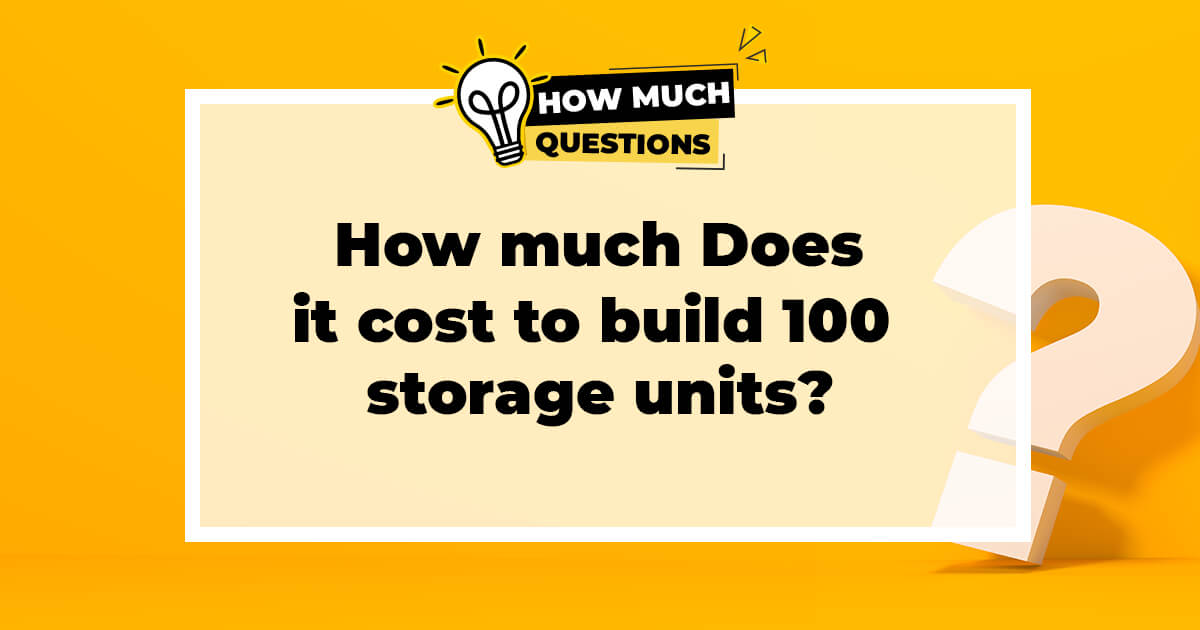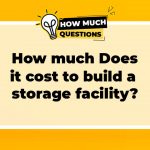How much does it cost to build 100 storage units?
Discover the key factors influencing the cost of building 100 storage units and get valuable tips to save money on your project.

Introduction
In the world of real estate, storage units have proven to be a lucrative investment. However, before diving into such a project, it's crucial to understand the intricacies of the costs involved. This blog post will provide you with a comprehensive breakdown of the factors that influence the cost of building 100 storage units, along with essential considerations to make and tips to help you save money. So, let's dive in.
How much does it cost to build 100 storage units?
The cost to build a self-storage facility varies based on several factors, including location, materials, and the number of units. Generally, the cost of constructing a self-storage facility ranges from $25 to $70 per square foot, according to Mako Steel, a company specializing in steel buildings for self-storage facilities. For instance, the construction of a single-story facility typically costs between $25 to $40 per square foot, while a multistory facility can cost between $42 to $70 per square foot. These figures do not include land or site improvement costs. Additionally, factors like fluctuations in steel prices, labor shortages, and regional differences can influence the overall cost.
Factors Influencing Cost
Location
The location of your storage unit facility plays a significant role in determining costs. Urban areas typically have higher land and construction costs, while rural areas may offer more affordable options. Consider local zoning regulations and accessibility when selecting your site.
Size and Design
The size and design of your storage units are crucial factors. Larger units with complex designs will naturally cost more to construct. Balancing functionality with cost-effectiveness is essential for maximizing profits.
Materials and Construction Quality
Choosing the right materials and construction quality is essential for long-term success. Opting for durable materials and skilled construction teams might increase initial costs but reduce maintenance expenses over time.
Permits and Regulations
Navigating through permits and regulations can be a complex and costly process. It's essential to budget for legal fees, permits, and compliance with local building codes to avoid potential setbacks and fines.
Land Preparation
Before construction can begin, the land may require preparation, such as excavation, grading, or utility connections. These costs can vary significantly depending on the condition of the site.
Pre-Purchase Considerations
Market Research
Before committing to the project, conduct thorough market research. Analyze demand for storage units in your chosen area, identify competitors, and assess rental rates. This will help you gauge the potential return on your investment.
Financing Options
Explore various financing options, including loans, partnerships, or investment groups. Carefully consider the interest rates and terms to choose the option that aligns with your financial goals.
Insurance and Liability
Insurance is a critical aspect of running a storage unit business. Factor in insurance costs to protect your investment from unforeseen events, such as theft, vandalism, or natural disasters.
Maintenance and Operations
Plan for ongoing maintenance and operational costs, including security, staffing, and marketing. A well-maintained facility can attract more customers and generate higher revenue.
Cost-Saving Tips
Bulk Material Purchase
Buy construction materials in bulk to take advantage of discounts. This can significantly reduce your overall construction costs.
Energy Efficiency
Invest in energy-efficient features, such as LED lighting and climate control systems. Although there may be initial costs, these investments can lead to substantial long-term savings.
DIY vs. Professional Services
Evaluate whether certain tasks, like landscaping or minor repairs, can be handled in-house rather than hiring professional services. This can trim your operational expenses.
Guidance for Optimal Choices
Professional Consultation
Consider consulting with industry experts or professionals who specialize in storage unit construction. Their insights can help you make informed decisions and avoid costly mistakes.
Long-Term Planning
Think beyond the initial construction costs. Plan for long-term profitability by offering competitive rental rates and continuously improving your facility's services.
Conclusion
In conclusion, the cost of building 100 storage units can vary widely based on several factors, including location, size, materials, and regulations. To make the most of your investment, conduct thorough research, budget wisely, and prioritize long-term sustainability.
Remember, this article is intended for informational purposes only. Always seek professional advice before making significant financial decisions in the real estate sector. If you have any questions or would like to share your thoughts, please feel free to leave a comment below. Your engagement is highly valued.
This article is provided for informational purposes only and does not constitute professional advice. Seek the guidance of qualified professionals when making financial decisions.
FAQ: Frequently Asked Questions
How much does it cost to build a storage unit?
The cost of constructing a storage unit can vary widely based on factors such as location, materials, size, and design. On average, the construction cost for a self-storage facility ranges from $25 to $70 per square foot. However, this does not include the cost of land or site improvements.
What factors influence the cost of building a storage unit?
Several factors can influence the cost, including:
- Location: Building in a metropolitan area might be more expensive than in a rural area due to higher land and labor costs.
- Materials: The choice of building materials, especially if opting for high-quality or specialized materials.
- Size and Design: A multi-story facility will typically cost more per square foot than a single-story facility.
- Site Improvements: Costs related to landscaping, parking, and other site improvements.
- Labor: Labor costs can vary based on the region and the availability of skilled workers.
Is it cheaper to buy an existing storage facility or build a new one?
Whether it's cheaper to buy an existing facility or build a new one depends on the specific circumstances. Purchasing an existing facility might be more cost-effective in the short term, especially if it's already generating revenue. However, building a new facility allows for customization and might be more beneficial in the long run if there's a specific vision or market need in mind.
How can I reduce the costs of building a storage unit?
To reduce costs:
- Choose a Cost-effective Location: Consider building in areas where land and labor are more affordable.
- Opt for Standardized Designs: Custom designs can be more expensive than standardized ones.
- Bulk Purchasing: Buying materials in bulk can lead to discounts.
- Hire Experienced Contractors: They can often complete the job faster and might have connections for better material prices.
How long does it take to build a storage facility?
The timeline for building a storage facility can vary based on its size, design, and other factors. On average, it might take anywhere from 6 months to 2 years from planning to completion.
Are there any ongoing costs associated with owning a storage facility?
Yes, owners will need to account for ongoing costs such as maintenance, utilities, property taxes, insurance, and staff salaries if the facility is staffed.
How profitable is the storage unit business?
The profitability of a storage unit business depends on factors like location, occupancy rates, operational costs, and competition. In areas with high demand and limited supply, storage facilities can be quite profitable.
What is the average size of a storage unit?
Storage units come in various sizes, but common dimensions include 5x5, 5x10, 10x10, 10x15, and 10x20 feet. The choice of size will depend on the items being stored.
Do storage units require special permits or licenses?
Yes, building a storage facility usually requires obtaining the necessary permits and licenses from local authorities. This might include zoning permits, building permits, and business licenses.
How do I determine the right number of storage units to build?
The number of units to build should be based on market research, including the demand for storage in the area, the size of units in demand, and the capacity of competitors. It's also essential to consider the size of the land and the budget.
 How much does it cost to build a car wash?
How much does it cost to build a car wash? How much does it cost to build a storage facility?
How much does it cost to build a storage facility? How Much Does It Cost to Buy a Laundromat?
How Much Does It Cost to Buy a Laundromat?If you want to know other articles similar to How much does it cost to build 100 storage units? you can visit the category Business Expenses and Start-up.
- Introduction
- How much does it cost to build 100 storage units?
- Factors Influencing Cost
- Pre-Purchase Considerations
- Cost-Saving Tips
- Guidance for Optimal Choices
- Conclusion
- FAQ: Frequently Asked Questions
- How much does it cost to build a storage unit?
- What factors influence the cost of building a storage unit?
- Is it cheaper to buy an existing storage facility or build a new one?
- How can I reduce the costs of building a storage unit?
- How long does it take to build a storage facility?
- Are there any ongoing costs associated with owning a storage facility?
- How profitable is the storage unit business?
- What is the average size of a storage unit?
- Do storage units require special permits or licenses?
- How do I determine the right number of storage units to build?


Leave a Reply